9 - Access to information laws (ATI)
Published online by Cambridge University Press: 05 April 2022
Summary
Kwame Kilpatrick is the former mayor of Detroit who was sentenced to 28 years in jail for a range of offences, following a string of allegations about misuse of public funds.
Kilpatrick was brought down by a campaign run by the Detroit Free Press which unpicked a sensational web of secrets. Kilpatrick's downfall starts with rumours about an alleged party with strippers at the mayor's mansion held while his wife was away. The rumour ran that his wife had returned unexpectedly and assaulted one of the strippers; and that the stripper was thought likely to testify in court. What we do know for sure is that a few months later the stripper was found dead, shot several times in her car.
Kilpatrick ended up in court after two whistleblowers from the Detroit police department alleged he had closed down an investigation into the shooting of the stripper. The Free Press unearthed text messages that showed Kilpatrick was having an affair with his chief of staff – something he had categorically denied in court. Freedom of information requests from the paper then uncovered a secret agreement Kilpatrick had reached with the whistleblowers, requiring them to keep their knowledge of the texts secrets.
Loren Cochran, writing on the website of the Reporters Committee for the Freedom of the Press, said:
The Detroit Free Press’ marvellous investigation into the veracity, or lack thereof, of testimony by Mayor Kwame Kilpatrick and Chief of Staff Christine Beatty during a multimillion-dollar whistleblower retaliation trial was all made possible due to Michigan's open records laws, and The Free Press’ dogged pursuit under the law to obtain these public employee's text messages.
This account glosses over one rather important detail. The texts that proved Kilpatrick had perjured himself – the texts that were the key to breaking the scandal – were leaked, not released under freedom of information (FOI) laws. The City of Detroit had successfully resisted information requests from the Detroit Free Press for a number of years. After the leaking of texts and their publication in January 2008, demonstrating that Kilpatrick had lied about his affair, the city council voted 8‒1 to release further information and the Detroit Free Press successfully progressed a range of information requests through the courts.
- Type
- Chapter
- Information
- Transparency and the Open SocietyPractical Lessons for Effective Policy, pp. 151 - 172Publisher: Bristol University PressPrint publication year: 2016



